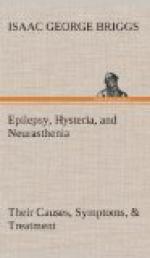There is no drug treatment for either hysteria or neurasthenia, and when the doctor gives medicines for these complaints, it is to remedy organic troubles, or, more often because necessity forces him to pander to the irrational and pernicious habit into which the public have fallen of expecting a bottle of medicine whenever they visit a doctor. Osier, the famous Professor of Medicine at Oxford, truly observed that he was the best doctor who knew the uselessness of medicines. But when public opinion demands a bottle, and is unwilling either to accept or pay for advice alone, the doctor may be forced to give medicines which he feels are of little value, hoping that their suggestive power will be greater than is their therapeutic value.
Neuropaths invariably contract the habit of physicking themselves, and taking patent foods and drugs which are valueless.
So universal is this pernicious habit that we deem it desirable to criticize it here at some length.
One highly popular type consists of port wine, reinforced (?) by malt and meat extracts, and sold under a fanciful name. It has about the same value as a bottle of port, which costs considerably less. It is well to remember that many a confirmed drunkard has commenced with these “restoratives”.
Malt extracts are also popular. They contain diastase, and therefore aid the digestion of starch, but the diastatic power of most commercial extracts is negligible.
Meat extracts of various makes contain no nourishment, but are valuable appetisers. Meat gravy is as effective and far cheaper.
Foods containing digestive ferments, which are widely advertised under various proprietary names are practically valueless, as are the ferments themselves sold commercially. Digestive disorders are very rarely due to deficiency of ferments, while pepsin is the only one among all the ferments that could act (and that only for a little while) in the digestive system.
Some of the disadvantages of predigested foods have been noted, and their prices are usually so exorbitant that eggs at 2_s._ 6_d._ each would be cheaper. The remarks of Sollmann the great pharmacologist are pertinent:
Limitations. The administration of food in the guise of medicine is sometimes advantageous; but medicinal foods are subject to the ordinary law of dietetics, and therefore cannot accomplish the wonders which are often claimed for them. The proprietary foods have been enormously overestimated, and have probably done more harm than good. The ultimate value of any food depends mainly on the amount of calories which it can yield, and on its supplying at least a minimum of proteins. In these respects, the medical foods are all inferior, for they cannot be administered practically in sufficient quantity to supply the needs of the body. They have a place as adjuvants to other foods, permitting the introduction of more food than the patient could otherwise be induced




